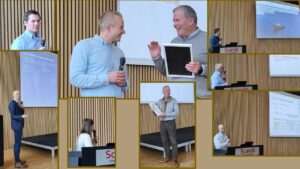 The NFOGM Fagdag, which was held by the Norwegian Association for Oil Measurement and Analysis (NFOGM), was this year held in Stavanger. A total of 110 participants had an inspiring day filled with professional training and good conversations during the breaks.
The NFOGM Fagdag, which was held by the Norwegian Association for Oil Measurement and Analysis (NFOGM), was this year held in Stavanger. A total of 110 participants had an inspiring day filled with professional training and good conversations during the breaks.
Steinar Vervik from the Norwegian Petroleum Directorate started the day by presenting the new regulation on fiscal measurement in the petroleum industry. We received a good review of the background to the new regulation, and comments on some of the changes, including vocabulary and requirements for measurement uncertainty and documentation. The next post was held by Tommy Jetmundsen, who gave a good overview of the challenges and experiences related to upgrading the measurement system for the Jotun FPSO. He showed how Vår Energi has been most successful in reusing parts of the existing measurement system, and discussed the advantages and disadvantages of reusing vs buying new, both in terms of workload, delivery time and future follow-up.
After the first break, Martin Lillo from Aker BP gave a presentation on temperature effects on measurements of oil flows and how to correct for these effects using K0 factors, also for oil that falls outside the limitations given in the NFOGM handbook for uncertainty calculations. This was an important topic that also engaged the audience, and the participants gained a thorough understanding of how temperature can affect the accuracy of oil measurements. Furthermore, Eirik Åbro from Equinor discussed the MuFA multiphase analyzer as an alternative to traditional sampling from test separators. He gave a thorough technical review of how MuFA works and showed results from the latest K-lab tests.
After a lot of technical and professional input, it was time for a good lunch, and the conversation continued eagerly in the hotel restaurant.
After lunch, the participants got an insight into how XSENS also uses ultrasound technology to measure water cuts with its clam-on meter, presented by Kjell-Rune Toftevåg. The participants were able to see detailed test results and got an impression of both the possibilities and limitations of this technology. The next presentation made us look up and forward, when Svein-Erik Losnegård from Gassco showed how Gassco works to develop infrastructure and technology that can support the transition to a low-carbon society. He discussed the status of new pipelines for hydrogen and CO2, and highlighted some measurement-related challenges.
In the last section of the day, the focus was on quality, sampling and analysis. Ole Øiestad from Intertek Westlab first gave an engaging presentation about the challenges associated with sampling separators. He explained how errors in sampling can result in large financial losses, and how to reduce the risk of such errors with good training and awareness. Hege Nilsen from Stratum Reservoir then presented a thorough review of the entire workflow from receipt of the sample at the laboratory until test results are returned to the customer.
Outgoing NFOGM chairman George McInally concluded the academic part of the day with a short update under the title “News from NFOGM”, focusing on the status of the work with online multiphase courses.
This year’s Achievement Award was then solemnly handed over to Steinar Vervik, for his great commitment to flow measurement, underlined by the work of recent years with the new measurement regulations. Ole Øiestad, who received the Bragd prize in 2021 online, was also duly honored at this year’s NFOGM Fagdag.
Overall, it was a very educational day, with many interesting presentations and opportunities for discussion and networking.
Presentations are available from the NFOGM.no website.
NFOGM Fagdag 2023 committee: Bjarne Syre (DNO), Morten Marstein (TechnipFMC), Rune Kirknes (Equinor ASA), Astrid Marie Skålvik (NORCE).